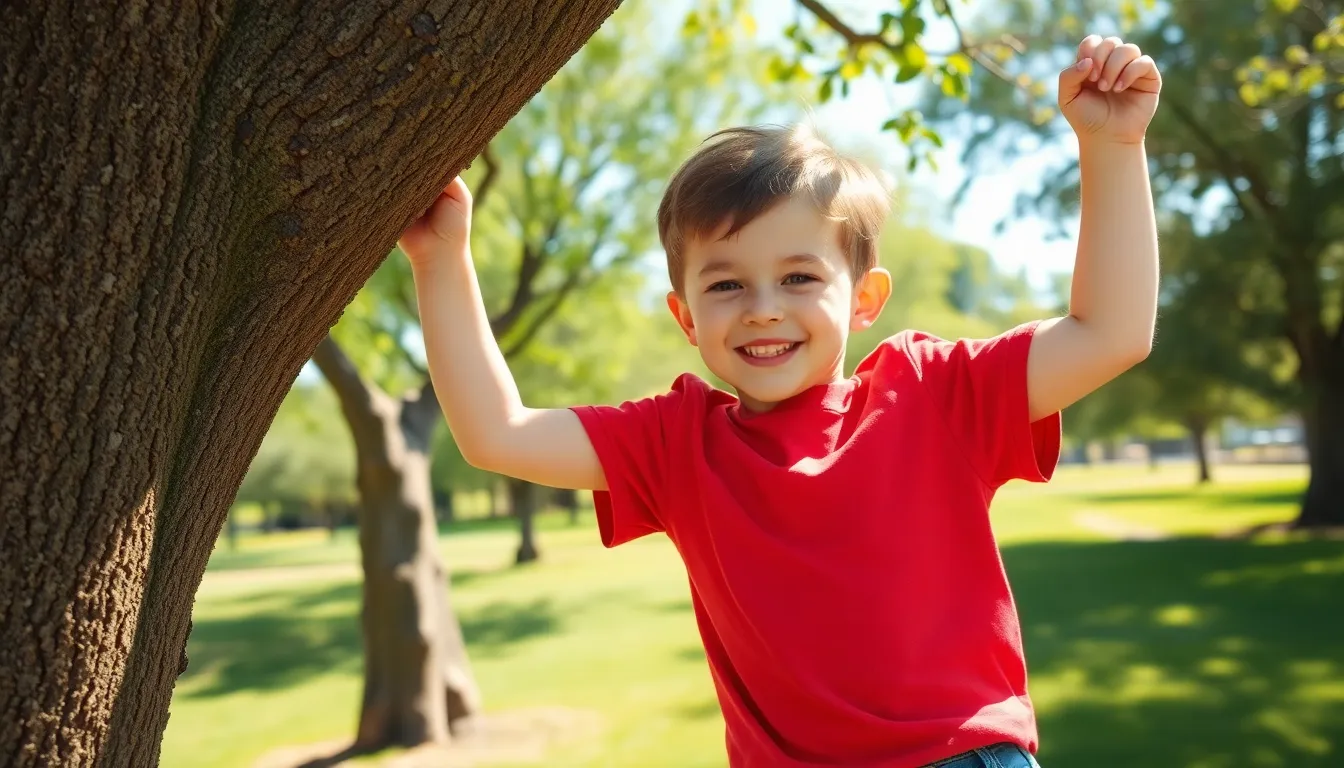Table of Contents
ToggleIn a world where parenting often feels like a competitive sport, free-range parenting emerges as the laid-back champion. Imagine letting your kids roam free like they’re on a quest in a video game, only with fewer dragons and more trees. This approach encourages independence, creativity, and the occasional scraped knee—because what’s a good adventure without a little risk?
Free-range parenting isn’t about neglect; it’s about trust. It’s giving kids the freedom to explore their surroundings while parents sit back, sip their coffee, and resist the urge to helicopter. With this parenting style, children learn valuable life skills, build confidence, and maybe even discover that the world isn’t as scary as it seems. So, buckle up as we dive into the delightful chaos of free-range parenting and uncover why it might just be the best way to raise the next generation of explorers.
Overview Of Free-Range Parenting
Free-range parenting promotes independence in children. This approach allows kids to explore their surroundings with minimal parental interference. They learn decision-making skills, embrace responsibility, and develop self-confidence through real-life experiences. Trust in children’s abilities is a cornerstone of this parenting philosophy.
Emphasis on exploration fosters creativity. Outdoor play, for instance, encourages problem-solving in unstructured environments. Kids navigate risks while learning assessment and critical thinking. Such experiences prepare them for future challenges.
Research supports the benefits of free-range parenting. Studies show children who engage in unstructured play demonstrate higher levels of creativity and resilience. These skills contribute to their emotional intelligence, equipping them for social interactions.
Societal shifts have led to increased concern over child safety. Nevertheless, free-range parenting argues that overprotection can stifle growth. By allowing autonomy, parents nurture adaptable individuals who thrive in diverse situations.
Successful free-range parenting requires a balance of freedom and guidance. Clear expectations and boundaries remain essential. Children benefit from knowing they can venture out but still have a supportive environment to rely on.
Critics of this approach raise valid concerns about potential dangers. However, proponents argue that risk-taking is an integral part of learning. With proper supervision and community awareness, children can safely explore while developing necessary life skills.
In essence, free-range parenting cultivates self-sufficient individuals. By encouraging exploration and responsibility, parents lay the groundwork for children to navigate life’s complexities confidently.
Key Principles Of Free-Range Parenting


Free-range parenting encourages children to thrive in an environment of trust and freedom. This approach emphasizes several key principles, including independence and risk-taking.
Independence
Independence forms the foundation of free-range parenting. Allowing children to navigate their surroundings fosters self-reliance. Kids engage in activities solo or with peers, gaining confidence in their capabilities. Parents provide opportunities for decision-making, which helps children learn from successes and failures. Skills acquired through independent exploration include problem-solving, critical thinking, and social interaction. By offering guidance without overt control, parents strike a balance that promotes healthy development. Children who experience autonomy tend to develop stronger emotional intelligence and resilience.
Risk-Taking
Risk-taking is an essential aspect of free-range parenting. Encouraging manageable risks enables children to assess their capabilities and explore their limits. Opportunities for moderate risks, like climbing a tree or navigating a busy playground, help build confidence and decision-making skills. Although concerns about safety often arise, supervised exploration allows for learning from consequences in a secure setting. By facing challenges, children learn how to adapt and bounce back from setbacks. This process not only nurtures their adventurous spirit but also lays the groundwork for future resilience and adaptability.
Benefits Of Free-Range Parenting
Free-range parenting offers numerous benefits that contribute to a child’s overall development. It encourages independence and fosters emotional growth.
Emotional Development
Emotional development flourishes within a free-range parenting environment. Children experience increased self-esteem when they navigate challenges independently. Independence facilitates resilience, allowing kids to confront setbacks and learn from mistakes. Engaging in unstructured play promotes creativity, enhancing emotional expression. According to research, children who partake in free-range activities demonstrate greater emotional intelligence compared to those under stricter supervision. The opportunity to make choices empowers kids, which bolsters their confidence in tackling social interactions. Therefore, fostering an emotionally healthy mindset supports the cultivation of well-adjusted adults.
Life Skills
Life skills grow through the tenets of free-range parenting. Children gain problem-solving abilities by facing real-world situations without constant adult intervention. Responsibility arises when children manage tasks on their own, such as navigating to a friend’s house or completing household chores. They develop essential decision-making skills by weighing options and assessing outcomes. Research indicates that kids engaged in independent activities show enhanced adaptability, crucial for future success. Furthermore, risk-taking experiences teach practical skills, fostering a sense of self-sufficiency. Ultimately, free-range parenting prepares children to handle life’s complexities with confidence and competence.
Challenges Of Free-Range Parenting
Free-range parenting comes with its set of challenges, particularly in navigating societal expectations and ensuring child safety.
Safety Concerns
Safety remains a significant issue for many parents. Fear of accidents or unexpected dangers often leads to concerns about children’s independence. Parents question whether their children possess the necessary skills to handle the risks associated with exploring environments unsupervised. Critics argue that allowing kids to roam freely exposes them to potential harm. Reports indicate a widespread perception that today’s world is more dangerous than in the past, despite statistics showing crime rates have declined. To address these worries, parents must establish reasonable boundaries and engage in open dialogues with their children about safety practices. These precautions can promote a balance between exploration and safeguarding.
Societal Pressures
Societal pressures exert influence on free-range parenting decisions. Many parents experience scrutiny from peers and family members regarding their methods. They face judgment on their choice to allow children freedom, often feeling the need to conform to traditional parenting norms. Social media amplifies these pressures, showcasing portrayals of the “perfect” parent who closely monitors their child’s every move. This environment creates doubt and can discourage free-range practices. To combat this issue, parents might seek support from communities that share similar values, fostering resilience against external expectations. Embracing connections with like-minded individuals helps affirm their approach and reduces feelings of isolation.
Popular Free-Range Parenting Strategies
Free-range parenting incorporates various strategies that promote independence in children. Encouraging unstructured play allows kids to explore their surroundings freely. Parents often designate safe areas for children to roam, enabling them to engage in physical activities without constant supervision.
Setting clear expectations is essential in free-range parenting. Families establish boundaries that provide children with freedom while ensuring safety. Discussing risks with kids also prepares them for real-world situations, fostering critical thinking.
Modeling trust works effectively in developing a child’s decision-making skills. Parents demonstrate confidence in their children’s abilities, which helps build resilience. Allowing children to make choices reinforces their sense of responsibility.
Community involvement plays a vital role in free-range parenting. Parents connect with neighbors to create a supportive environment for independent play. Engaging with local groups fosters a sense of security and shared values.
Scheduling regular family discussions about safety teaches kids how to navigate challenges. Open conversations create space for children to express their concerns and experiences. Such dialogues develop strong communication skills necessary for future interactions.
Utilizing technology responsibly also contributes to free-range strategies. Devices can offer parents real-time updates about their children’s whereabouts while encouraging independence. Establishing guidelines for tech use ensures kids remain connected but not overly reliant on screens.
Lastly, embracing the outdoors enhances children’s physical and emotional well-being. Nature fosters creativity and problem-solving, vital components of emotional intelligence. Parents who encourage outdoor exploration cultivate adventurous spirits in their children.
Free-range parenting offers a refreshing alternative to traditional approaches by prioritizing children’s independence and exploration. It encourages kids to develop essential life skills while fostering creativity and resilience. By trusting children to navigate their environment, parents can help them grow into self-reliant individuals capable of handling life’s challenges.
While concerns about safety and societal pressures exist, the benefits of allowing children the freedom to explore are profound. Open communication and community support can help parents strike a balance between freedom and guidance. Ultimately, embracing free-range parenting can lead to confident and capable future generations, equipped to thrive in an ever-changing world.




